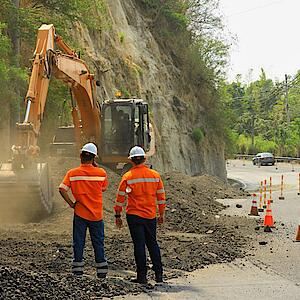CABEI reaffirms its commitment to the region’s environmental and social sustainability

CABEI has a new 2018-2019 environmental and social strategy focused on supporting its members in priority actions regarding environmental and social sustainability.
Tegucigalpa, December 8, 2017.- In order to increase the regional relevance of CABEI as a catalyst for resources to strategically address the environmental and social challenges and opportunities of the Central American region, the Board of Directors of the Central American Bank for Economic Integration (CABEI) approved the 2018-2019 Environmental and Social Strategy.
The foregoing will instrumentalize the Bank's commitment to the provision of financial solutions that promote sustainability and mitigation and resilience to the effects of climate change in the population and integrally improve the region's competitive profile.
The initiative is part of a wide-ranging effort by CABEI that seeks to optimize support to countries in meeting the goals established, specifically in terms of environmental and social sustainability, both at the country and regional level.
The document guarantees alignment with the mandate proposed in the CABEI Environmental and Social Policy, as well as with the CABEI Institutional Strategy (2015-2019) regarding the sector perspective, the streamlining of its strategic axis and the definitions of its Mission, Vision and Strategic Purpose.
CABEI’s Executive President, Dr. Nick Rischbieth stated that, “As part of its responsible commitment to the planet and through the implementation of the Environmental and Social Strategy, CABEI together with the support of other strategic management tools seeks to strengthen its contribution to the fulfillment of the goals defined by the countries of the region regarding environmental and social matters through the capture of greater resources from specialized sources.”
With this tool, CABEI will promote environmental, social, economic and cultural development in line with the worldview of indigenous peoples, in addition to fostering gender equality in the actions to be developed, based on the guiding principles of the CABEI Environmental and Social Policy related to good international practices, sustainable development financing, transparency, consultation and citizen participation.
The Strategy will enable the establishment of a sustainable business model aligned with the priorities defined by the countries of the region. Its objectives are as follows:
• Increase the relevance and positioning of CABEI as a provider of financial solutions to the sector in order to generate a greater impact on development.
• Promote the capture of financial resources from specialized sources.
• Promote the generation of initiatives in coordination with relevant actors for the sector.
• Promote operational efficiency in the institution and in the relevant actors for the sector.
CABEI has provided financial resources for projects aimed at mitigating and increasing the resilience of countries to face the effects of climate change. In this regard, it recognizes that the challenges in terms of environmental and social sustainability are significant and that greater effort is required to coordinate initiatives in coordination with key actors that enable the strengthening of the resource base for such initiatives.
In addition, the value proposition of the strategy corresponds to the provisions of the global development agenda, particularly with regard to compliance with the Sustainable Development Goals (SDGs), COP21 action lines and Intended Nationally Determined Contributions (INDC). As the region’s strategic ally, CABEI hopes to support the countries in the process of achieving the goals of the 2030 Agenda, both at the national and regional level.




![[Translate to English:] [Translate to English:]](/fileadmin/_processed_/e/3/csm_WhatsApp_Image_2024-04-18_at_2.12.23_PM__2__590ef43ade.jpeg)

